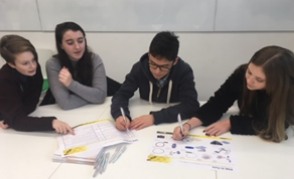Wellcome Genome Campus – Cambridge
Miss H. Spiller, Subject Leader: Biology, writes:
On Tuesday 20th November, Year 12 biologists visited the Wellcome Genome Institute in Hinxton.
At the campus they visited the Sanger Institute one of the foremost centres of genomics research and innovation in the world, carrying out leading-edge scientific research that uses genome sequences to understand the biology of humans and pathogens (organisms that cause diseases, such as bacteria and viruses).
They also spoke to researchers based at European Molecular Biology Laboratory’s European Bioinformatics Institute which provides data services and training that help scientists realise the potential of ‘big data’ in the biological sciences, paving the way for discoveries that benefit humankind.
Our students got to hear from researchers and scientists that currently work at the institute and are at the forefront of cutting edge research including work on malaria and cancer. They had the opportunity to hear from scientists which are part of the ‘Human Cell Atlas’ project and the ‘Earth Bio-genome project’ which is a global effort to sequence the genetic code, or genomes, of all 1.5 million known animal, plant, protozoan and fungal species on Earth.
The Year 12 students worked in groups to analyse DNA and proteins related to skin cancer and MRSA. The visit finished with a tour of the sequencing and data centre.
‘The buildings and architecture was very impressive and it was all really energy efficient.’ Lucy Thompson
‘It was amazing to see Chromosome 22 in book form.’ Allyna Farrell
‘The technology was incredible. The internet speed – you can now sequence a human genome in less than one hour, compared to 20 years ago when it took 13 years to sequence one human genome.’ Muskaan Ahmed
‘The fact they have only just found a brand new type of cell called Ionocytes in lung tissue that they think may be the cause of cystic fibrosis, is mind-blowing.’ Pia Joyce
‘It was great to be able to identify a mutation occurring in the DNA of a patient in the workshop run by the Institute.’ Harry Cross







